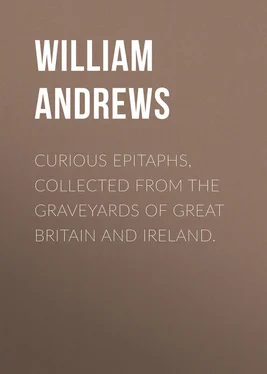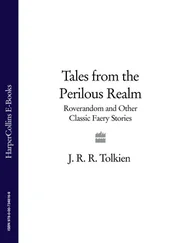William Andrews - Curious Epitaphs, Collected from the Graveyards of Great Britain and Ireland.
Здесь есть возможность читать онлайн «William Andrews - Curious Epitaphs, Collected from the Graveyards of Great Britain and Ireland.» — ознакомительный отрывок электронной книги совершенно бесплатно, а после прочтения отрывка купить полную версию. В некоторых случаях можно слушать аудио, скачать через торрент в формате fb2 и присутствует краткое содержание. Жанр: foreign_antique, foreign_prose, на английском языке. Описание произведения, (предисловие) а так же отзывы посетителей доступны на портале библиотеки ЛибКат.
- Название:Curious Epitaphs, Collected from the Graveyards of Great Britain and Ireland.
- Автор:
- Жанр:
- Год:неизвестен
- ISBN:нет данных
- Рейтинг книги:4 / 5. Голосов: 1
-
Избранное:Добавить в избранное
- Отзывы:
-
Ваша оценка:
- 80
- 1
- 2
- 3
- 4
- 5
Curious Epitaphs, Collected from the Graveyards of Great Britain and Ireland.: краткое содержание, описание и аннотация
Предлагаем к чтению аннотацию, описание, краткое содержание или предисловие (зависит от того, что написал сам автор книги «Curious Epitaphs, Collected from the Graveyards of Great Britain and Ireland.»). Если вы не нашли необходимую информацию о книге — напишите в комментариях, мы постараемся отыскать её.
Curious Epitaphs, Collected from the Graveyards of Great Britain and Ireland. — читать онлайн ознакомительный отрывок
Ниже представлен текст книги, разбитый по страницам. Система сохранения места последней прочитанной страницы, позволяет с удобством читать онлайн бесплатно книгу «Curious Epitaphs, Collected from the Graveyards of Great Britain and Ireland.», без необходимости каждый раз заново искать на чём Вы остановились. Поставьте закладку, и сможете в любой момент перейти на страницу, на которой закончили чтение.
Интервал:
Закладка:
William Andrews
Curious Epitaphs, Collected from the Graveyards of Great Britain and Ireland
Preface
For many years I have collected curious epitaphs, and in this volume I offer the result of my gleanings. An attempt is herein made to furnish a book, not compiled from previously published works, but a collection of curious inscriptions copied from gravestones. Some of the chapters have appeared under my name in Chambers’s Journal , Illustrated Sporting and Dramatic News , Newcastle Courant , People’s Journal , (Dundee), Press News , and other publications. I have included a Bibliography of Epitaphs, believing that it will be useful to those who desire to obtain more information on the subject than is presented here. I have not seen any other bibliography of this class of literature, and as a first attempt it must be incomplete. In compiling it I have had the efficient aid of Mr. W. G. B. Page, of the Hull Subscription Library, who has also prepared the Index.
I must tender my thanks to the following friends for their valued assistance: Mrs. Geo. Linnæus Banks, author of the “Manchester Man,” Mr. W. G. Fretton, F.S.A., Mr. Walter Hamilton, F.R.G.S., Mr. Jno. H. Leggott, F.R.H.S., Rev. R. V. Taylor, B.A., Mr. H. Vickery, and others whose names appear in the following pages.
In conclusion, I hope that this book will merit from readers and reviewers a similar welcome to that granted to my former works; in that case I shall have every reason to be satisfied with my pleasant labour.
WILLIAM ANDREWS. Hull Literary Club, October 1st, 1883.EPITAPHS ON PARISH CLERKS AND SEXTONS
Amongst the most curious of the many peculiar epitaphs which are to be found in the quiet resting-places of the departed are those placed to the memory of parish clerks and sextons. We have noted at various times, and at different places, many strange specimens, a few of which we think will entertain our readers.
In the churchyard of Crayford is a grave-stone bearing the following inscription: —
The life of this clerk, just three score and ten,
Nearly half of which time he had sung out “Amen;”
In youth he was married, like other young men,
But his wife died one day, so he chanted “Amen.”
A second he took, she departed – what then?
He married and buried a third with “Amen.”
Thus his joys and his sorrows were treble, but then
His voice was deep bass, as he sung out “Amen.”
On the horn he could blow as well as most men;
So his horn was exalted to blowing “Amen.”
But he lost all his wind after three score and ten,
And here, with three wives, he awaits till again
The trumpet shall rouse him to sing out “Amen.”
In addition to being parish clerk, Frank Raw, of Selby, Yorkshire, was a grave-stone cutter, for we are told: —
Here lies the body of poor Frank Raw,
Parish clerk and grave-stone cutter,
And this is writ to let you know
What Frank for others used to do,
Is now for Frank done by another.
The next epitaph, placed to the memory of a parish clerk and bellows-maker, was formerly in the old church of All Saints, Newcastle-on-Tyne: —
Here lies Robert Wallas,
The King of Good Fellows,
Clerk of All-Hallows,
And maker of bellows.
On a slate head-stone, near the south porch of Bingham Church, Nottinghamshire, is inscribed: —
Beneath this stone lies Thomas Hart,
Years fifty eight he took the part
Of Parish Clerk: few did excel.
Correct he read and sung so well;
His words distinct, his voice so clear,
Till eighteen hundred and fiftieth year.
Death cut the brittle thread, and then
A period put to his Amen.
At eighty-two his breath resigned,
To meet the fate of all mankind;
The third of May his soul took flight
To mansions of eternal light.
The bell for him with awful tone
His body summoned to the tomb.
Oh! may his sins be all forgiv’n
And Christ receive him into heav’n.
In the same county, from the churchyard of Ratcliffe on Soar, we have a curious epitaph to the memory of Robert Smith, who died in 1782, aged 82 years: —
Fifty-five years it was, and something more,
Clerk of this parish he the office bore,
And in that space, ’tis awful to declare,
Two generations buried by him were!
In a note by Mr. Llewllynn Jewitt, F.S.A., we are told that with the clerkship of Bakewell church, the “vocal powers” of its holders, appear to have been to some extent hereditary, if we may judge by the inscriptions recording the deaths and the abilities of two members of the family of Roe which are found on grave-stones in the churchyard there. The first of these, recording the death of Samuel Roe, is as under: —
He had three wives, Millicent, who died in 1745, aged 22; Dorothy, who died 1754, aged 28; and Sarah, who survived him and died in 1811, at the age of 77. A grave-stone records the death of his first two wives as follows, and the third is commemorated in the above inscription.
Respecting the above-mentioned Samuel Roe, a contributor to the Gentleman’s Magazine wrote, on February 13th, 1794:
“Mr. Urban,
“It was with much concern that I read the epitaph upon Mr. Roe, in your last volume, p. 1192. Upon a little tour which I made in Derbyshire, in 1789, I met with that worthy and very intelligent man at Bakewell, and, in the course of my antiquarian researches there, derived no inconsiderable assistance from his zeal and civility. If he did not possess the learning of his namesake, your old and valuable correspondent, I will venture to declare that he was not less influenced by a love and veneration for antiquity, many proofs of which he had given by his care and attention to the monuments in the church, which were committed to his charge; for he united the characters of sexton, clerk, singing-master, will-maker, and school-master. Finding that I was quite alone, he requested permission to wait upon me at the inn in the evening, urging, as a reason for this request, that he must be exceedingly gratified by the conversation of a gentleman who could read the characters upon the monument of Vernon, the founder of Haddon House, a treat he had not met with for many years. After a very pleasant gossip we parted, but not till my honest friend had, after some apparent struggle, begged of me to indulge him with my name.”
Читать дальшеИнтервал:
Закладка:
Похожие книги на «Curious Epitaphs, Collected from the Graveyards of Great Britain and Ireland.»
Представляем Вашему вниманию похожие книги на «Curious Epitaphs, Collected from the Graveyards of Great Britain and Ireland.» списком для выбора. Мы отобрали схожую по названию и смыслу литературу в надежде предоставить читателям больше вариантов отыскать новые, интересные, ещё непрочитанные произведения.
Обсуждение, отзывы о книге «Curious Epitaphs, Collected from the Graveyards of Great Britain and Ireland.» и просто собственные мнения читателей. Оставьте ваши комментарии, напишите, что Вы думаете о произведении, его смысле или главных героях. Укажите что конкретно понравилось, а что нет, и почему Вы так считаете.












